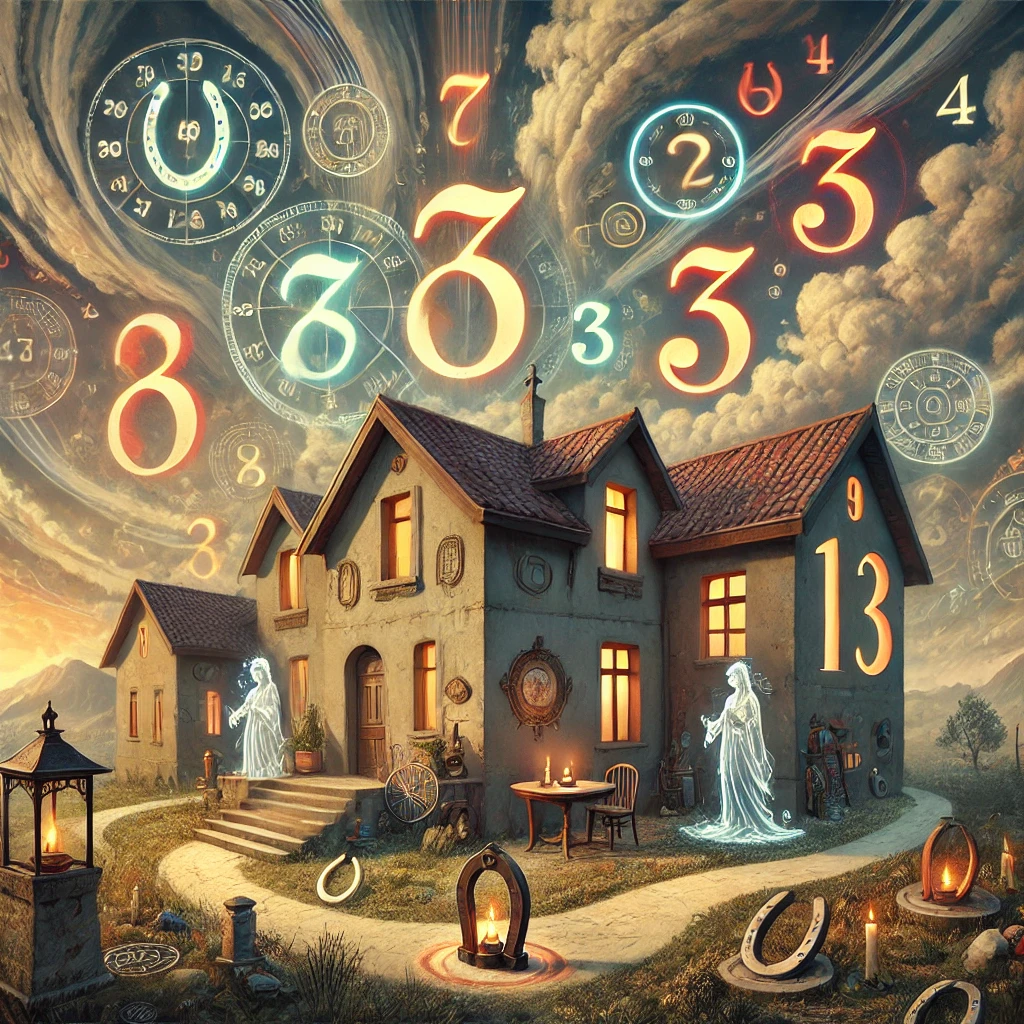Superstitions in real estate: how numbers and rituals influence transactions?

- How do superstitions and numerology influence real estate transactions?
- Why do Chinese people avoid the number four and what does it mean for real estate?
- How do cultural traditions influence real estate choices in different countries?
Among the population involved in real estate transactions, there are many myths and superstitions, which are even influenced by people with higher education. Some of them are convinced that performing certain rituals or following omens can bring luck in the process of searching for housing, while others, on the contrary, believe that certain symbols can drive away happiness. An important aspect of such beliefs is numerology, which is particularly popular among buyers.
Lucky and Unlucky Numbers
Numbers are divided into lucky and unlucky. For example, Joe Eccles, the director of the London agency Sourcing Property, shares an interesting case from his practice: one of his clients categorically rejected a property option with a certain door number, even if the offers were quite tempting. To please her, the neighbors in their Mayfair building agreed to remove the door and mailbox number from her apartment.
Fear of the Number 13 in the USA
In the United States, the fear of the number 13 takes on significant proportions. Developers often avoid including this floor in their projects altogether, so after the twelfth, there is a fourteenth. Apartments located on the 13th floor are generally less attractive to buyers and often sell much later. According to CityRealty, less than 5% of high-rises in Manhattan and Brooklyn have the "unlucky" 13th floor. However, in one well-known skyscraper—One57—the developers decided to keep the 13th floor, but it is not intended for residential use; it will be commercial.
Illusion of Height
Kevin Maloney, the director of the construction company Property Markets Group in New York, says: "If there is even the slightest chance that people might not want to live on the 13th floor, why not change its number? It also creates the illusion of the building's height, which is important for New York." This approach makes buildings visually more impressive.
Superstitions in the Film Industry
The fear of the number 13 has even penetrated the world of cinema. For example, in the film "1408," the action takes place in a fictional hotel in New York, where the 13th floor is missing. However, on the 14th floor, there is room 1408, the sum of the digits of which conceals this "cursed" number. It is in this room that key events unfold, filled with terrifying moments.
Superstitions and Real Estate
Joe Eccles has many clients who refuse to make final decisions or sign contracts on Friday the 13th due to superstitions associated with that date. Moreover, properties with the number six in their name can deter buyers, as in Christian traditions, the number 666 is considered the "number of the beast." People often become wary when all three indicators – house number, floor, and apartment – contain the number six.
In general, superstitions continue to have a significant impact on the choice of real estate, putting people in amusing situations and forcing them to make unexpected decisions. These beliefs can have both positive and negative effects on the real estate market and on individuals making decisions about their future homes. Thus, at first glance, ordinary numbers can drastically influence the preferences and opinions of both buyers and sellers.
The negative attitude of Chinese people towards the number "four"
Residents of China do not have a particular fondness for the number "four," as in their language, this sound is associated with the word that translates to "death." In the summer of 2013, a couple from New Zealand purchased a home in the suburbs of Auckland, saving $40,000 off the original price.
There is an opinion that this property was listed for sale at such a low price specifically because its number 44 raised concerns among Chinese buyers who are actively participating in the New Zealand market. According to Camilla Dell, director of Black Brick,"Asians, including the Chinese, are very superstitious when it comes to numbers."They try to avoid buying properties with the numbers 4, 17, 19, and 53, while numbers like 1, 2, 6, 8, and 68 are considered lucky and popular.
The meaning of the number "eight"
In Chinese culture, the number "eight" has special phrases of good luck, as its pronunciation is associated with the concept of "prosperity." Ben Everest, a partner at The Lighting Design Group, says:"The number eight is a lucky number.""and often appears in business transactions. For example, a property valued at £595,000,000 was ultimately sold for £588,888,888."
The magic of numbers in Las Vegas
Las Vegas, a city where gambling has become part of the local culture, also attracts people who place special importance on“the magic of numbers”Houses and apartments with the number "seven" in their addresses are quite popular here.
People from the Philippines also pay attention to the date of the deal; for good luck, the numbers in the date should be arranged so that the hand finishes its movement at the top (for example, 0, 5, and 8).
Even and odd house numbers
Additionally, some people have a habit of buying only those houses whose numbers are either even or odd.
- “Not long ago, a couple who moved into our complex in Kent bought more than 20 houses.”
- “They claim that luck only accompanied them in those properties that had even numbers,” says Julia Price, the sales and marketing director of Pentland Homes.
Religious beliefs and real estate transactions
There are many traditions and beliefs associated with buying real estate, both in traditional and non-traditional religions. For example, Christians believe that Saint Joseph can assist them.
In the US, it's not uncommon for people to bury statues of saints in their gardens or flower pots, believing that it will speed up the selling process and make it more profitable. This tradition is simple, yet even some realtors engage in such practices.
- There are stories about how a residential property remained unsold for a long time;
- And only after the statue of Saint Joseph was placed did the offers to buy come in.
The philosopher Francis Bacon emphasizes that for orthodox Jews, it is important for housing to have a special elevator, as on Shabbat, which is considered a holy day, work is prohibited, as well as using buttons on various technical devices, including elevators.

Housing traditions of Israel
In Israel, it is common practice to equip residential buildings with elevators that automatically shut down on Saturdays.
9 October 2024
29 September 2025
9 October 2024
29 January 2025
29 January 2025

The influence of feng shui on Chinese consumers
When choosing real estate, Chinese investors often follow the principles of feng shui, which significantly influences their preferences. Richard Barber, a partner at W. A. Ellis, stated:“Feng Shui plays a crucial role for our Chinese clients.”They strive to acquire housing near bodies of water, which are considered sources of positive energy, creating a harmonious and cozy environment.
Vastu Shastra and Indian Buyers
On the other hand, Indian buyers are guided by the principles of Vastu Shastra — an ancient planning system originally developed for temples, which is now becoming relevant for private homes as well. Camilla Dell emphasizes that“Vastu Shastra is extremely important for our Indian clients.”However, among the many properties in London, there are quite a few that do not meet these standards, making it difficult to find suitable real estate. Typically, Indians prefer to purchase properties at the construction stage so they can determine the layout of the rooms and the directions the windows will face themselves.
Astrology and decision-making
It is also worth noting that some real estate buyers pay attention to astrological factors that influence decision-making. For example,There is an opinion that when Mercury is in retrograde, it is an unfavorable period for signing contracts and conducting any transactions.
Rituals for checking the energy in the house
Some clients go even further and invite clergy to inspect the properties to ensure there is no negative energy or evil spirits in the house. In some cases, real estate agencies use incense sticks to“cleansing”of the houses being considered, thereby creating a more positive atmosphere.
- A couple from Thailand invited a Buddhist monk to assess their house in California. The monk explained that the tree in the garden had become a dwelling place for an evil spirit.
- In another case in Arizona, new owners hired a Native American shaman to rid their home of negative energy.
The energy of space for the Chinese.
The Chinese also have specific beliefs about the energetic state of space. There is a belief that any obstacle in front of a house, whether it's a tree or another structure, can block the flow of positive energy, or "qi," which is why such houses are not preferred.In their culture, buildings located at T-intersections are considered undesirable.
Discounts on real estate in Hong Kong
In Hong Kong, you can find housing offers with discounts of up to 40% if tragic events have ever occurred in those places. Properties associated with violent deaths fall into the category of“huntza”Many buyers avoid such apartments and houses. People are wary of the dark energy associated with these places, and therefore they readily refuse to purchase them.
Conclusion
The conclusion of this article highlights the extent to which superstitions continue to influence the real estate market in today's reality. As the author of this material, I have come to the conclusion that in a world where high technology and scientific achievements are reached, beliefs related to numbers and rituals remain an important aspect of the process of buying and selling property. Despite the fact that many of us consider ourselves rational individuals, under the influence of superstitions, we are capable of making decisions that contradict common sense.
Cultural differences in the perception of numbers
It's interesting to note how different cultures perceive numbers differently. While the number13causes fear and dissatisfaction among consumers in the USA, while in Chinese culture, this number is considered unlucky, whereas the number8On the contrary, it is associated with prosperity and good luck. These aspects further emphasize how cultural traditions shape perception and how this theme is projected onto housing choices.
Rituals and religious beliefs
Superstitions are not limited to just numbers. Rituals associated with various religions and beliefs also have their roots in preparing for real estate transactions. All of this leads to the main idea:
- Despite technological breakthroughsAnd despite the increasing rationality in society, human nature is still firmly gripped by fears and hopes.
- Therefore, for sellers and buyers, not only the quality and price of the property become important, but also its numerical symbolism.
- The presence or absence of certain spiritual attributes also plays a role.
Result
No matter how much we strive for a scientific approach, such characteristics appear as a given that must be taken into account. Ultimately, the real estate market is not just about transactions and investments, but also a reflection of our hopes, fears, and perhaps intangible desires. It is important to stay informed and consider these aspects in order to minimize the potential consequences of irrational biases in business.
Tags
Comment
Popular Posts
9 October 2024
1489
29 September 2025
408
9 October 2024
9952
29 January 2025
1549
Popular Offers

Subscribe to the newsletter from Hatamatata.com!
Subscribe to the newsletter from Hatamatata.com!
I agree to the processing of personal data and confidentiality rules of Hatamatata











